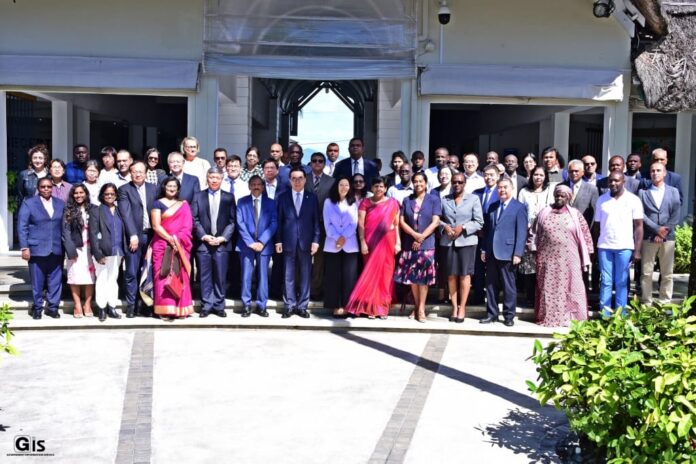Mauritius: A four-day regional training workshop on satellite crop monitoring using the crop watch innovating system, under the Crop Watch Innovative Cooperation Programme (ICP) for Africa, is being held from 07 to 10 August 2023 at the Ambre Hotel in Belle Mare.
It aims to make member countries more versatile with innovative tools and benefit to the maximum from the programme.
The opening ceremony was held on Monday 07 August in the presence of the Vice Prime Minister, Minister of Education, Science and Technology, Leela Devi Dookun-Luchoomun. The Senior Chief Executive of the Ministry of Agro-Industry and Food Security, Moheenee Nathoo, the Secretary for Foreign Affairs, Joyker Nayeck, the UN Resident Coordinator in Mauritius, Lisa Simrique Singh and other personalities were present.
The regional workshop will be regrouping some 26 participants from different African countries and ten organisations from Mauritius, including Food and Agricultural Research and Extension Institute, Agricultural Services, University of Mauritius, Mauritius Sugarcane Industry Research Institute, and Meteo Meteorological Services.
In her address, Vice Prime Minister Dookun-Luchoomun stated that the world faces global climate challenges while indicating that it is more pressing for the Small Islands Developing States. She underscored that it is imperative to bolster resilience in the agricultural sector to face external shocks.
She indicated that the COVID-19 and Ukraine and Russian war crisis served as a poignant reminder of how external factors can lead to a food crisis and disrupt the supply of essential food items and prices.
Mauritius, she emphasised, has remained at the forefront of providing solutions to boost the agricultural sector and promote development through pioneering solutions.
The sector, she underlined, has evolved and continues to drive progress in agriculture, adding that there are new competent graduates in the field to take the sector to a new level of development. The satellite crop monitoring holds a promising potential for identifying areas at risk of drought or flooding and implementing necessary mitigation measures while facilitating the lives of planters, she remarked.
Moreover, The Vice Prime Minister pointed out that research, innovation, and capacity building are essential in moving the agriculture sector forward as it profoundly influences a nation’s development towards a more secure and sustainable future.
She added that access to cutting-edge technologies remains a considerable challenge to SIDS. She stressed that regional and international collaborations are important to pool resources and expertise and facilitate networks and partnerships to grapple with current challenges.
For her part, Nathoo indicated that satellite image is an innovative tool to make better-informed decisions, minimise losses and maximise yields, thus building resilience in agriculture. The government, she pointed out, actively support smart agricultural practices adding that several projects are being implemented to sensitise farmers on new climate adaptation programmes.
As for Nayeck, he stressed the need to tap into the potential of science and technology to upscale food production and ensure food security. He stated that the international community must collaborate to provide better service to humanity, ensuring food security and eliminating Hunger in line with the SDGs.
UN Resident Coordinator Singh observed that Mauritius imports more than 70% of food commodities, which according to her, is very alarming. The innovative project will help the country to become self-sufficient and develop resilience in food security through international cooperation and partnership, she underpinned.
About the Crop Watch ICP
The Crop Watch ICP was launched in 2021 by the United Nations Conference for Trade and Development (UNCTAD) in collaboration with the Alliance of International Science Organizations (ANSO), and the Aerospace Information Research Institute (AIR) of the Chinese Academy of Sciences (CAS).
The programme aims at enhancing capacities for food security early warning using the Earth observation satellite system for crop monitoring in developing countries and achieving Sustainable Development Goals, particularly Goal 2: Zero Hunger.
In 2021, a 2-month online intensive training was held for participants from 12 countries, including one research scientist from FAREI, Mauritius. In the same year, a country bulletin for Mauritius was prepared from theoretical knowledge acquired under the training and was published in the May 2021 issue of the Crop Watch Bulletin for Global Crop Production by the Aerospace Information Research Institute and Chinese Academy of Sciences (AIRCAS)
In 2022, FAREI carried out field activities across several tomato plantations in Goodlands, pineapple plantations in Senneville, onion plantations in Petit Sable and potato plantations in Helvetia regions, using a mobile App for crop monitoring downloaded on smartphones.
UNCTAD invited Mauritian participants to share their experience at an event organised on 28 March 2023 at the United Nations Palais des Nations in Geneva.
